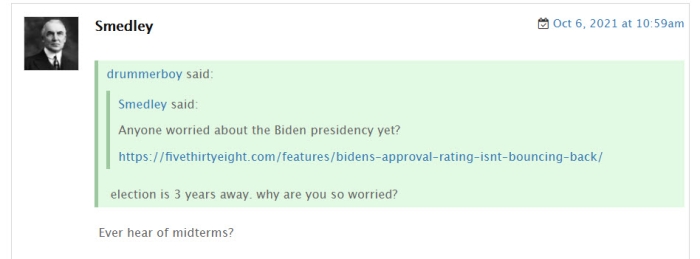Post mid-term chaos? Or not.
DaveSchmidt said:
Or, it’s like saying that the team’s record is a reflection of the players’ performance, and that their performance affects how fans perceive others associated with the team, like managers and ownership. You look at the record and might get an idea of how easily fans will start booing.
I don’t think anyone is arguing that the rating, per se, is causative. That’d be silly, as has been noted. Regrettably, I’m doing a poor job of conveying an idea that might not be so silly, so will leave it at that.
I think what I'm trying to say is this:
- presidential approval is just one data point, and on its own isn't all that informative. It only becomes interesting once we try to figure out why the approval rating is what it is -- what factors are driving that? And in the context of trying to game out implications for other officeholders and candidates, it becomes interesting insofar as asking "how do we think the factors that are affecting the president's approval rating will affect this other office or race?"
If an analysis starts and stops with presidential approval rating, it's not interesting or useful. If an analysis starts with that as a springboard into trying to understand the driving factors, that becomes more interesting and useful.
ml1 said:
But does the number that Gallup or any other polling organization publishes by itself cause people to vote one way or another?
No. And when Smedley said the rating held implications for the midterms, or could even be “causative” of results, I took him to be referring to what the rating reflected, not the number by itself.
as I wrote in another thread even the usefulness of presidential approval as a predictive metric may have been lessened, particularly for Democratic presidents. When that number is almost completely inelastic among Republican voters, it has less value in a predictive model. When the range of a metric becomes restricted, it's simply less useful. And thanks to right wing voters, Democratic presidential approval ratings have become somewhat limited to a fairly narrow band of 10-15 points. There's a reason the numbers that get plugged into a model are called variables.
DaveSchmidt said:
ml1 said:
But does the number that Gallup or any other polling organization publishes by itself cause people to vote one way or another?
No. And when Smedley said the rating held implications for the midterms, or could even be “causative” of results, I took him to be referring to what the rating reflected, not the number by itself.
I'm pretty sure he didn't mean that because if he had admitted to that, I wouldn't have been dumb enough to argue as long as I did. (Although it was pretty stupid of me to argue that long anyway.)
PVW said:
If an analysis starts and stops with presidential approval rating, it's not interesting or useful.
”Starts and stops” is a point that nobody has suggested, as far as I can tell. The belief that a president’s popularity isn’t a causative factor, as far as I could tell, was.
ml1 said:
I'm pretty sure he didn't mean that because if he had admitted to that, I wouldn't have been dumb enough to argue as long as I did. (Although it was pretty stupid of me to argue that long anyway.)
It’s possible that my efforts to understand what Smedley has been saying on his own terms misguided me.
DaveSchmidt said:
It’s possible that my efforts to understand what Smedley has been saying on his own terms misguided me.
I'm never entirely sure I understand what Smedley is arguing. I suspect that half the time it's a case of everyone being in violent agreement.
Keeping an eye on Lake:
Inside Kari Lake’s war room, where Republicans are grappling with defeat
I feel if there's going to be a Trumpist attack on election results, it'll be in AZ. And if it doesn't happen there, it means its probably not going to happen (and suggests that Trump's muted presence on the national stage has made a real difference).
PVW said:
Presidential approval isn't causative.
Sure it is. If you're saying it's not, you're disputing this research, which shows presidential approval is causative for the midterms. What is your basis for disputing this research?
Smedley said:
Sure it is. If you're saying it's not, you're disputing this research, which shows presidential approval is causative for the midterms. What is your basis for disputing this research?
Perhaps I read through too quickly and missed it, but the link seems to say its correlated, not causative? I also suspect that our newest data point of the recent elections may prompt some revisions in their analysis.
PVW said:
Smedley said:
Sure it is. If you're saying it's not, you're disputing this research, which shows presidential approval is causative for the midterms. What is your basis for disputing this research?
Perhaps I read through too quickly and missed it, but the link seems to say its correlated, not causative? I also suspect that our newest data point of the recent elections may prompt some revisions in their analysis.
The correlation is how presidential approval ratings Aug through Oct, correlate with midterms results from Nov. If the second thing in that sequence is correlated with the first thing, that indicates causation.
I agree the correlation should weaken with this year's results.
Smedley said:
If the second thing in a sequence is correlated with the first thing, that indicates causation.
I disagree with this. Things can correlate for one of three reasons:
1. One is causing the other
2. Both are affected by a third factor or factors
3. It's a coincidence
People tend to underestimate #3. https://www.buzzfeednews.com/article/kjh2110/the-10-most-bizarre-correlations
Your argument, as I understand it, is that we can generally assume #1.
Mine is that simply observing correlation doesn't tell us enough to distinguish between 1, 2, and 3. With presidential approval in particular, I'm arguing that it's mostly #2, with a small allowance for #1 via the halo effect .
Fair enough. I made that statement general when I shouldn't have.
I do think the research report pretty clearly shows causation as spelled out by this:
"As approval falls the greater the number of seats lost by the President’s party. In this sense the midterm is taken as a referendum on the incumbent president."
Smedley said:
Fair enough. I made that statement general when I shouldn't have.
I do think the research report pretty clearly shows causation as spelled out by this:
"As approval falls the greater the number of seats lost by the President’s party. In this sense the midterm is taken as a referendum on the incumbent president."
I don't think that study is nearly as strong as you think it is.
First of all, the dataset is pretty tiny, as it has to be. Not sure how much you can draw from that.
Secondly, it states the following:
From 1936-2018, near the midterms, six presidents have had approval ratings in the range of 40-45%--like Biden. Those cases involved wide variation in seat loss or gain. The range of outcomes in the Senate was between -9 and +2 seats. The
average was a loss of 4. In the House, presidents with approval between 40-45%, saw their party lose between 63 and 13 seats, with an average loss of 36 seats. There have been no instances of House seat gains for Presidents with approval as low as Biden’s.
The number of seats lost for low-approval Presidents (and not coincidentally, using an even smaller dataset) is all over the place.
Thirdly, between 1936 and now, the political landscape has changed an awful lot. Comparing voter behavior in 1936 to 2018 doesn't make a lot of sense.
I just think the study is a bit simplistic. At least the part relating to approval.
Smedley said:
PVW said:
Smedley said:
Sure it is. If you're saying it's not, you're disputing this research, which shows presidential approval is causative for the midterms. What is your basis for disputing this research?
Perhaps I read through too quickly and missed it, but the link seems to say its correlated, not causative? I also suspect that our newest data point of the recent elections may prompt some revisions in their analysis.
The correlation is how presidential approval ratings Aug through Oct, correlate with midterms results from Nov. If the second thing in that sequence is correlated with the first thing, that indicates causation.
I agree the correlation should weaken with this year's results.
the notion that correlation doesn't imply causation is so well established, it has its own wikipedia page. Not to say there aren't instances were correlation is causation (pretty sure cold temperatures cause water to freeze for example). But in many cases there is a confounding third variable that is the cause of two phenomena being correlated with each other.
DaveSchmidt said:
ml1 said:
I'm pretty sure he didn't mean that because if he had admitted to that, I wouldn't have been dumb enough to argue as long as I did. (Although it was pretty stupid of me to argue that long anyway.)
It’s possible that my efforts to understand what Smedley has been saying on his own terms misguided me.
I think the last several comments here have made it all very clear
Sarah Pailin tells conservatives to stop donating money to the GOP…. That’s the most intelligent thing she’s said in her entire life!!!
PVW said:
So are Democrats going to eliminate the debt ceiling or what?
Biden said recently that eliminating the ceiling would be "irresponsible", though I can't find why he thinks that. Dumb decision.
https://rollcall.com/2022/10/21/biden-dismisses-calls-for-abolishing-debt-limit/
Hard to say which is worse - having a debt ceiling that the GOP tries to make a scene over every couple of years, or the Democrats eliminating it and the GOP lies about what that really means ("DEMOCRATS VOTE FOR UNLIMITED NATIONAL DEBT!!!!!") for years and years and years.
Let me be the first here to wish POTUS a restful 80th birthday tomorrow!
nohero said:
Hard to say which is worse - having a debt ceiling that the GOP tries to make a scene over every couple of years, or the Democrats eliminating it and the GOP lies about what that really means ("DEMOCRATS VOTE FOR UNLIMITED NATIONAL DEBT!!!!!") for years and years and years.
Is it worse to defuse a bomb, or to defuse it and have the GOP lie about what it really means?
If we had a reasonable SCOTUS, I'd say that if Democrats don't eliminate the filibuster, Biden should just ignore it as it's plainly self-contradictory for Congress to simultaneously pass laws allocating funds and have a law preventing spending those funds.
Sinema leaving the Democratic Party, just after Warnock wins. Maybe she realized she can no longer hold the party hostage and therefore she’s making a personal move to benefit her donors and herself? Raphael Warnocks’ victory is almost erased. Imagine if Joe Manchin does what she has done? Shouldn’t someone elected on a party ticket be prohibited from leaving that party until their term is up? I would have expected Manchin to do that, but I am not too surprised.




















it's scary how many people are voting for candidates who are (and I don't think this is hyperbole) evil.